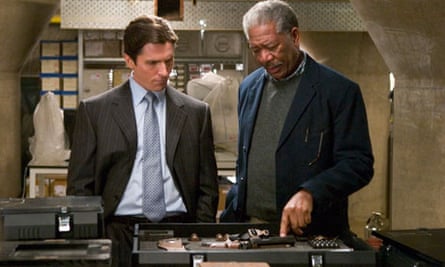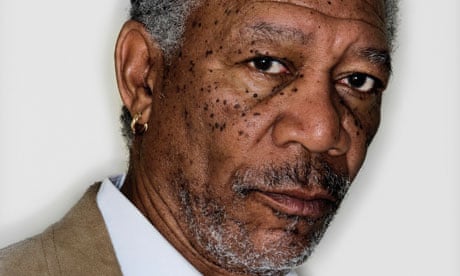If you enjoy hearing, as I do, a spirited denunciation of stubborn Republican resistance to Barack Obama over the past three years, then you could do a whole lot worse than have it declaimed to you by Morgan Freeman in his warm and ever authoritative baritone.
"At the outset of Obama's administration, the political right [meaning Senator Mitch McConnell] literally said, out loud: 'The No1 project of this party is to make sure that this guy – this guy – only serves one term.' How do you make sure of that? You don't allow him to do anything good or worthwhile. Every chance you get, block him, and that's what they've done. Which now allows them to say: 'He's failed, he can't get anything done.' If he loses, it simply proves what you always feared, that democracy can be bought, and that the country is owned by the rich. And if everything gets bought, how do we ever get the country back?"
For all the subdued anger in his voice, Freeman is, as expected, a cool and emollient presence as around him the press junket for The Dark Knight Rises noisily unfolds. The last time we met, he stood up and I got a sore neck waiting for him to reach his full height. Now, quite still, with long slender arms on the chair arms, back straight and knees bent, he creates an impression of serpentine undulation, like a slinky-toy spooling itself down steps.
So, the election of an African-American president has not cast us into a sunlit utopian "post-racial" society? "No, not at all, instead the whole thing uncovered" he pauses in sorrow or anger, "plenty of maggots still squirming around there under the stone."
We're here to talk about the concluding panel of Christopher Nolan's Batman triptych, which he resisted directing for a while, having failed to answer for himself the pertinent and sobering question: how many movie trilogies have a triumphant part three? Once all doubts had been cast off and filming began, though, Nolan threw himself into the project, a calm head at the centre of the whirlwind, like Napoleon leading his grande armée film crew across the globe. Not that he's Napoleonic, says Freeman.
"If you walked on the set and I said go talk to the director, you'd have a hard time picking him out. And even then, you might look straight past him. He's quiet, but it's a quiet authority, and he enjoys doing it."
It was always going to be a problem topping Heath Ledger's vivid and unsettling performance as the Joker in the second film. Here, Christian Bale's Bruce Wayne, reclusive, inactive for eight years, weakened and chastened, comes out of his obscurity to tackle Bane (Tom Hardy), a giant who wears an immovable mask that pumps perpetual doses of anaesthetic into his bulked-up body. Where Ledger was chaos embodied, Bane is unstoppable brute strength. As Freeman has it: "Bane is to Gotham what bats were to Batman, a fear the city has to overcome."
What impact did the death of Ledger after The Dark Knight have? "Well, it's a downer when anything happens to an actor in mid-production. In fact, he didn't die during production, his part was wrapped up, but the movie itself wasn't out yet. People connected the character to his death because the character was so ... evil – people imagine that the role leaks into the man or something. And I don't think that was the case at all."

Like its two predecessors, The Dark Knight Rises contains political echoes of the zeitgeist. The League of Shadows had an al-Qaida-ish lust to destroy what they saw as an incorrigibly corrupt Gotham, while The Dark Knight's Joker embodied chaos, which Freeman calls "a quality I associate with the right". For the villain in The Dark Knight Rises to share a name, during this election, with Mitt Romney's increasingly infamous investment group – Bain Capital – seems almost too good to be true, especially since Bane also makes ever more demagogic appeals to a Gotham populace polarised along Tea Party/Occupy-movement lines, even as he is readying the immolation of their city.
I couldn't quite make the timeline work on this, though: surely shooting had wrapped before Occupy took off? Freeman clarifies: "Someone asked Christopher that question yesterday, and he said he didn't intentionally think of anything political in the development of the story. So I think the politics here, if there are any, is like art or beauty, it's largely in the eye of the beholder."
In the midst of all this stand Bruce Wayne's father-surrogates, Michael Caine's avuncular Alfred and Freeman's Lucius Fox, CEO of Wayne Enterprises and personal armourer to the Batman, ever eager to show off his new toys, which this time include "the Bat", a tooled-up helipod that, yes, comes in black. When I remind Freeman that Nolan has expressed interest in doing a Bond movie, he chuckles long and hard, imagining what franchise-invigorating mayhem the director might wreak on Bond. "Funny thing is, with Lucius Fox, Chris is already halfway there – after all, Lucius is Batman's 'Q'."
Father-surrogate to Batman or not, Freeman's career, at the age of 75, is inevitably taking on certain crepuscular, autumnal hues. Recently he featured in the Geritol Generation dream-cast of oldsters in RED ("Retired"), and The Bucket List, his "dream-come-true to work with Jack" [Nicholson], a comedy about facing impending death with dignity, a large scotch and a parachute. His next movie, Last Vegas, features Freeman and fellow pensioners Robert De Niro, Christopher Walken and Michael Douglas on an old farts' bachelor weekend in Sin City. "Guess which one's the Lothario skirt-chaser?" he asks, and we enjoy a dirty laugh at Douglas's expense.
Many of his co-stars of the same age are walking off into the sunset, including Gene Hackman, Freeman's tormentor from Unforgiven. "Gene and I share the same agent, and he is fully retired. He's like, nah, I wanna stay home and write my novels and paint." And although Unforgiven director Clint Eastwood has also largely retired from acting, Freeman says: "He will keep directing literally until he drops dead. Working for him was three of my happiest times in the movies. He's the same way John Huston was: 'The art of directing lies mainly in casting; once you cast somebody, get out of the way.' I love that. And Huston kept directing right till the last moment, too."
So what keeps Freeman going, now that he's worth an estimated $70m (£45m) and should by rights be sailing his 40ft ketch in the Caribbean, instead of slogging it out with the media?
"What keeps anyone going? I have work. I have things to do. I prefer working to idleness. And I like my job. I'm lucky, I'm not working because I have to; I'm working because I love to."
He especially loved playing Nelson Mandela in Eastwood's Invictus. He has known Mandela for years. "It's funny how we met – he kind of summoned me. When he published Long Walk to Freedom, he was asked: who would you want to play you in the movie? And he said: 'Morgan Freeman.' Which was pretty nice of him, I thought. So I met him at his house in Jo'burg. I said: 'If we do this, I'm going to need to have access to you, to be close enough to hold your hand.' So every time we were in any kind of proximity or I had a shot at being around him for a while, we sat down together." What's he like? "From a distance, he has an aura, that legendary quality. Up close, the reassuring thing is, he's just a guy."
And South Africa? "First time I was terrified, in 1992, I think. Mandela was out of jail, but he wasn't president yet. The Zulus and the Nationals were combining because they knew that the ANC had the numbers behind them. So riots were sprouting up all over the place. We were there to make a movie called Bopha [Freeman's directorial debut, starring Danny Glover, 1992]. It was about a black policeman, a guy his own community basically ostracises as an agent of apartheid, when he's really just trying to keep chaos at bay. We asked permission to film in Soweto, we had two riots to shoot, and we just figured, well, we'll just start a riot today," and he bursts out laughing at the suicidal idiocy of the idea. "We did it elsewhere in the end."
Today however, he sees growing political dysfunction in South Africa. "Right now," he says in a disenchanted tone, "the politics are totally controlled by the ANC. They can pretty much buy the presidency. I was there for the Jacob Zuma election and they had guys going out in the townships, buying people's votes with food parcels. They do it here, they do it over there ..."
Freeman's political astuteness, his unwillingness to draw antagonistic lines between black and white, reflect a childhood spent in segregated 1940s Mississippi, and in bleak northern ghetto towns such as Gary, Indiana and Chicago's South Side, and an early manhood spent in a US Air Force that had only recently become desegregated. In New York in the 60s, the theatre kept him busy until he snagged a part in the ensemble, pre-Sesame Street kids' programme The Electric Company, from 1970 to 1977 (I especially liked his crooning vampire, who bathes in a coffin). His was a long apprenticeship in movies, until his vicious pimp character in the 1987 thriller Street Smart won him an Oscar nomination. From that point on, the string of titles we now associate him with began – Daisy, Glory, Shawshank Redemption, Seven, Kiss the Girls, leading to roles such as President Tom Beck in Deep Impact, which made him America's leading cinematic purveyor of assurance, calm and steadiness. And, not unimportantly, a cultural harbinger of President Obama.
Not that he's always so emollient. He has taken well-aimed pot-shots at PC linguistic niceties – "I hate the phrase 'African American'," he says, "because 'black' is beautiful. One syllable versus seven" – and other sacred cows such as Black History Month, which he sees as a form of temporal segregation, with blacks ghettoised within February, the Tuesday of the year. "I've said it before, black history is American history, they're completely intertwined."
We end where we began, with Obama: "The thing that really makes me angry is the whole rightwing focus on his blackness – his white mother is never mentioned. Even today, all this reminds you that if you have mixed-race parents, the first thing you learn is that the white half doesn't matter to anyone but you. Don't think you're white, because no one out there will ever let you forget you're black. It ain't gonna work."
Delivered again in that beautiful baritone, even a harsh lesson like that goes down smoothly.
The Dark Knight Rises goes on general release in the UK on 20 July










Comments (…)
Sign in or create your Guardian account to join the discussion